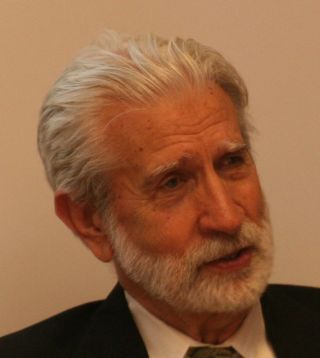Aging
How a Buddhism Teacher Deals With His Own Pain
A Buddhism professor explains how he copes with his suffering, aging, and death.
Posted December 15, 2023 Reviewed by Monica Vilhauer
Key points
- Thinking about pain and aging philosophically is different from experiencing them for yourself.
- "We seem to have a continuity of thoughts, but we don’t. We have flash after flash of thoughts."
- By observing the different flashes of your thoughts, you can shift your focus away from pain.

When I visited 91-year-old UC Berkeley professor of Buddhism, Lewis Lancaster, last month, I asked him how he was dealing with his own pain, suffering, illness, aging, and death. Because I was deeply moved by his answers, I decided to share Dr. Lancaster’s answers in this article.
But first, who is Professor Lancaster?
Professor Lancaster is an Emeritus Professor of the Department of East Asian Languages at the University of California, Berkeley and was the Chair of Buddhist Studies at that same university. Dr. Lancaster was a key figure in the creation of the descriptive catalogue and digitization of the Korean Buddhist Canon. He was awarded the 2014 Grand Award from the Korean Buddhist Order for his contribution to Buddhism, which he studied and taught most of his life.
Dr. Lancaster and his Taiwanese team are currently creating a dictionary of Buddhism terms.
Just a few months ago, Dr. Lancaster went to Taiwan, where he was celebrated for his life achievement in Buddhism. But soon after he came back, he had health problems that required him to live in a skilled nursing facility for a few months, which is where I met him shortly after he celebrated his 91st birthday.
I was curious to know how a professor who studied and taught Buddhism most of his life was facing his own illness, his own getting older, and the prospect of his own death.
So here are my questions and his answers:
How do years of studying and teaching Buddhism influence you as you get older?
For years, I have taught about the three great messengers in Buddhism: Illness, old age, and death. It was easy to teach about them philosophically, but now I must experience them and that is very different. I must live with illness for days, weeks, and months at a time. I must live with old age for the rest of my life, and I don’t have any other alternative. So, I must ask myself, what do those messengers have to teach me?
What I am learning is that old age, illness, suffering, and pain are necessary for us not to be so arrogant. We feel we can control the world and we live with that fantasy far too often, but the messengers teach us that this process of illness, aging, and death is inevitable, and you will get it one way or another. The power that we think we have is limited and momentary.
Are you afraid of death?
I am not afraid of death. I had an experience with a friend of mine as we went to Australia as consultants. We flew over, we did our consulting work and, on the way back home, my friend had a fatal heart attack on the plane. As the flight attendant and I were trying to help him, he smiled and thanked us, then lowered his head and that was it, he was gone.
When I saw how quickly he went, I thought "that’s not too bad. I can do that too when my moment comes". It seemed easy because I will probably never experience my moment of death. By the time my death happens, my cognition will have ceased, and my consciousness will already be gone.
So, I stopped worrying about death which seems easy to me. It’s just illness, pain, suffering and old age that are not so easy.
How do you cope with your own illness, pain, and suffering?
Suffering is part of life. The key is to know how to cope with it.
Sometimes, I don’t have time to be philosophical. Pain can be so distracting that I lose all ability to think about anything else than “I hurt”. So, when this happens, I know I must live through the pain. There is no alternative.
Other times, I find that in the middle of having pain, my thoughts turn to something else, a detail in the room or a different thought, and I realize that while I am thinking about this other thing, I am not hurting.
I try to remember that I am the one who says this sensation is painful, but it is just a sensation.
I learned to observe my thoughts. At a single moment, I can only have one experience, one thought. I can’t have a mix of experiences or thoughts.
The real issue is the continuity of thoughts. We seem to have a continuity of thoughts, but we don’t. We have flash after flash of thoughts, but they are all separate and momentary.
Everything is momentary, even suffering, because momentary is all we have. Our brain can see it as continuity, but each moment is just that moment. The next moment is different.
When I was in intense pain last month, my son came to see me, and he held my hand. His holding my hand felt extremely comforting. It didn’t stop my pain but the comfort I felt made the pain more tolerable.
When I am by myself, I must seek some other kind of comfort. It is the only antidote. Every person will find their own antidote that will make their pain more tolerable.
How do you deal with your own aging?
Aging is like growing up. I always thought that people grow up and then they are finished growing, but it isn’t the case. Every day we grow up, every day we age, everyday our strength changes and we must learn how to be old and not to resent it.
Now, old age is my greatest friend because it is the only thing that stands between me and death.
You talk about the three messengers: Illness, old age, and death. Is there a fourth messenger?
Yes, there is something else: There is a state of walking through all the suffering being calm, collected, and focused.
People might ask: How can a person be calm and collected without being upset, worried, or frightful when their world is filled with terror?
How you achieve that calm state is different for each person. Everybody has their own way.
If you manage to be calm, collected, and focused, life is much better for you.
It’s like being “in the zone.” I can compare it to Kobe Bryant when he was playing basketball. At times, Kobe was “in the zone.” He stopped thinking in a normal way, and he just experienced everything as one.
What do you want people to remember about your teachings?
I don’t teach; people learn.
I try to help create a space for people to experience something but what they are experiencing is their own learning and nobody else’s.
By observing the different flashes of your thoughts, you can focus on each moment.
No moment stays the same. No emotion stays the same. You are not going to be happy all the time, but you are not going to be sad all the time either. Everything is subject to change.
When you are happy, you must be aware that it will not last forever. If you cling to your happiness, your suffering will be worse when your happiness is gone.
To the degree that you can let go of expectations, get up in the morning and say “I don’t know what today is going to be, I will take it as it comes.”
References
The Korean Buddhist Canon: A Descriptive Catalogue by Pr. Lewis R. Lancaster In collaboration with Sung-bae Park, University of California Press Berkeley




